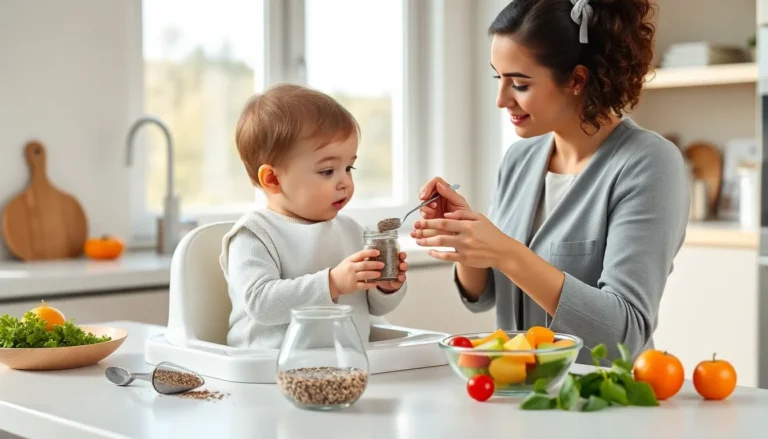Table of Contents
ToggleWhen new parents think about introducing new flavors into their baby’s diet, the question ‘Can babies have poppy seeds?’ often pops up. Picture this: a tiny tot exploring the world of food with curiosity, their taste buds getting excited by all sorts of flavors. But wait. Before diving into the seed-filled fun, it’s crucial to get the lowdown on whether these little flecks are a go or a no. In this text, we’ll not only explore the ins and outs of poppy seeds, but we’ll also make sure you’re equipped with all the healthy alternatives. Sit tight, because it’s about to get seed-tastic.
Understanding Poppy Seeds

Nutritional Value of Poppy Seeds
Poppy seeds are small but mighty when it comes to nutrition. They pack a punch with their rich content of healthy fats, protein, fiber, vitamins, and minerals. Particularly, they contain calcium, magnesium, and zinc, making them an excellent source of nutrients that are beneficial for growing bodies. It’s almost like a treasure chest of health benefits, waiting to be explored.
Potential Health Benefits
Besides being a nutritional powerhouse, poppy seeds have been heralded for their potential health benefits. From promoting healthy digestion to supporting overall bone health, these little seeds can play a part in a balanced diet. Incorporating such nutrient-dense foods could be advantageous, providing a carefully curated array of vitamins and minerals for young ones. But, moderation is always key.
Risks Associated with Poppy Seeds
Allergic Reactions and Sensitivities
Unfortunately, with any food, there comes the chance of allergies. Poppy seeds are no exception. Although rare, some babies might have a sensitivity or allergic reaction to these seeds. Symptoms can range from mild rashes to more severe reactions. Parents should monitor their little ones closely after introducing any new food, just in case a poppy seed party becomes a bit too wild.
Choking Hazards for Infants
Another pivotal concern is the risk of choking. Since poppy seeds are tiny, they might seem harmless, but for infants still mastering the art of chewing, they could pose a choking hazard. This calls for caution. Always ensure that any food given to babies is appropriately prepared and presented.
When to Introduce Poppy Seeds to Your Baby
Age Recommendations
Generally, most pediatricians recommend waiting until babies are at least 12 months old before introducing poppy seeds. This timeline helps ensure that their digestive systems are developed enough to handle such foods. Patience is truly a virtue in this case, and waiting will likely serve little ones well.
How to Safely Prepare Poppy Seeds
If the time comes for poppy seeds to enter the menu, it’s essential to prepare them safely. Always grind or crush them before serving, as this can help minimize choking risks and enhance digestibility. Incorporating them into foods like oatmeal or baby-safe muffins can be an enjoyable way to introduce new flavors. Safety first.
Alternatives to Poppy Seeds for Flavoring
Herb and Spice Options
If parents are hesitant about poppy seeds, there are plenty of alternatives to consider. Fresh herbs such as basil, parsley, and dill can add delightful flavors without the potential risks associated with poppy seeds. Spices like cinnamon or nutmeg can also provide a flavorful punch that’s suitable for babies, keeping meals exciting and nutritious.
Safe Baby Foods to Consider
When it comes to flavoring baby foods, there’s a variety of safe options. Pureed fruits and vegetables can be enhanced with different textures and tastes, from apples to peas. Introducing these other food options can ensure little ones have flavorful experiences without compromise.






